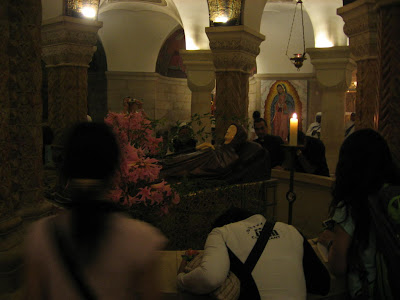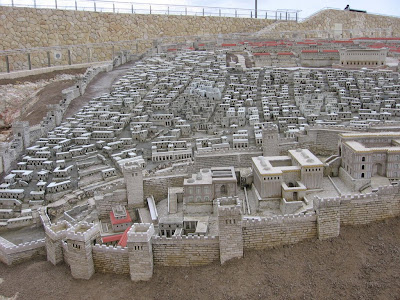 The new moon set last night, ushering in Rosh Chodesh Elul.
The new moon set last night, ushering in Rosh Chodesh Elul.(To understand how the Hebrew lunar calendar works, please see my post New moon, new month.)
 Elul is the month for intense spiritual preparation for the coming year and the High Holy Days (Rosh HaShana, New Year Day, falling on September 30 this year).
Elul is the month for intense spiritual preparation for the coming year and the High Holy Days (Rosh HaShana, New Year Day, falling on September 30 this year).Today Sephardi Jews (like in my village) already began their daily pre-dawn shofar-sounding and penitential prayers, Slichot, in the synagogue that will go on for the next forty days.
It's all about confession, repentance, and both seeking and granting forgiveness.
I passed an old boxer tree near the spring, many of its carob pods already on the ground.
And today "by chance" I came across this appropriate midrash in the wonderful book, Food at the Time of the Bible:
"A little known translation of Isaiah 1:19-20 brings us from carob as poor people's fare to carob as a symbol of privation.
The usual translation reads 'If you are willing and obedient, you will eat the best from the land; but if you resist and rebel you will be devoured by the sword.'
A more accurate reading of the verse results in the translation 'you will devour the carob.'
The words for 'sword' and 'carob' are almost identical in Hebrew, perhaps because of the scimitar-shape of the carob's seedpod.
The association between the carob and privation is also noted in an ancient Midrash, or homily, written in the wake of the Temple's destruction and the period of ensuing want in the land. 'A Jew has to suffer anguish and privation to the point of a menu exclusively of carobs, and only then does he accept the rule of God and repent...'"
.










 The 100+ participants in ABC Wednesday have dug up different F words for their photos. Check out a few
The 100+ participants in ABC Wednesday have dug up different F words for their photos. Check out a few 




















.jpg)
+of+the+Theotokos.gif)
















